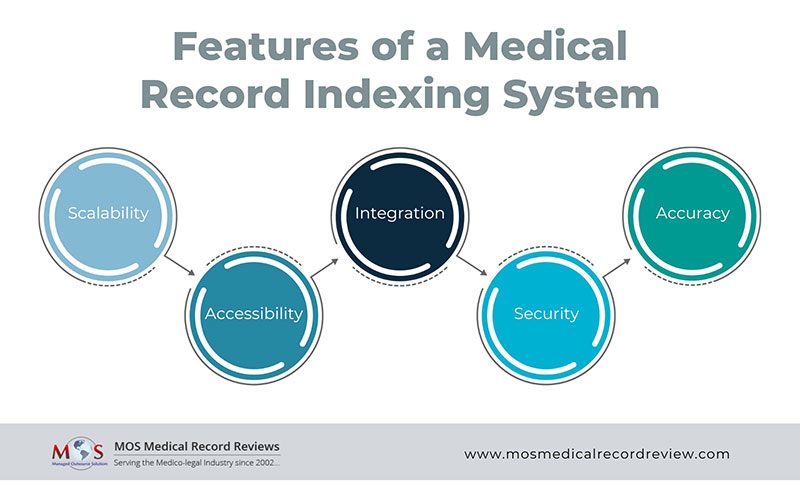In the current digital era, every second sees a large amount of valuable data being generated and mined for deep insights. Among them, around 30% is being generated by the healthcare industry alone. What is the relevance?
Amidst this data deluge, it wouldn’t be a straightforward task for healthcare providers to quickly and efficiently access healthcare information. According to the World Health Organization (WHO), disordered medical records contribute to operational inconsistencies which eventually have a negative impact on patient care and outcomes.
However, it can be made possible through utilizing an overlooked component in modern healthcare-medical record indexing. Indexing of medical records offers a structural way of organizing, storing and retrieving relevant patient information, anytime. This post will explore the role of indexing medical records, how it impacts patient care and why partnering with a professional agency like Managed Outsource Solutions (MOS) that provides expert medical records services is a good option.
Understanding Medical Record Indexing
It is the process of properly organizing and structuring patient records in a manner where these are easily accessible by medical and non-medical professionals alike. These records contain a patient’s health information such as medical history, diagnostics, treatment procedures, prescriptions and billing details.
The incorporation of Electronic Health Records (EHRs) has changed the way in which medical records are stored and handled. Yet, without record indexing, it would be difficult for even the most advanced EHR systems to precisely scan and retrieve relevant documents. Indexing assigns a unique metadata to every record, which means that they can be found and accessed amidst the heaps of assorted information.
Why Is Medical Record Indexing Important in Healthcare?
- Improved Patient Care: One of the most important requirements for delivering quality care is accurate and swift access to patient records. Indexing medical records enables providers to have a bird’s eye view of the patient’s medical history, which in turn reduces the chances of any manual errors, manipulated tests or prescribing contraindicated medications.
- Organizing Administrative Processes: It is common for administrative teams to spend countless hours sifting through volumes of disorganized records. However, proper indexing bypasses this hassle, enhancing workflow efficiency and also reducing the workload on the administrative team, thereby enabling organizations to allocate more resources towards patient care.
- Streamlined Billing and Coding: Accurate indexing improves billing and coding processes. Properly indexed records allows the billing team to identify and assign appropriate codes for procedures, diagnoses, and treatments, thereby reducing the chances of any errors. This promotes an improved revenue cycle management and reduces administrative burdens.
- Enhanced Patient Satisfaction: Patients expect that their healthcare providers will have instant access to their medical information at all times. Proper indexing helps meet this expectation as it fosters smooth communication and reduces wait times, thereby improving the overall patient-provider experience.
- Analytics and Research: Indexed medical records are a treasure trove for healthcare researchers and administrators who can now easily access relevant information to help identify trends, assess patient outcomes and make informed decisions based on that. These data are of great importance particularly in scenarios like population health management and predictive analytics.
- Legal and Regulatory Compliance: Since healthcare providers have to adhere to guidelines like HIPAA, it is important that the patient records are complete and easily retrievable. Indexing ensures that the records are organized and relevant data is readily accessible for legal or audit, thereby ensuring compliance.
What Are the Salient Features of a Medical Record Indexing System?
An effective medical indexing system should possess the following features:
- Scalability: Considering the unpredictability of medical data growth, the indexing system should have the capability to scale and meet the demands accordingly.
- Accessibility: The medical records should be easily searchable and accessed at a few clicks, using keywords, dates or other items.
- Integration: The present system must be easily integrated with the existing EHR platforms and other healthcare systems, without any hassle.
- Security: Patient privacy cannot be compromised. Therefore, the system must comply with all privacy regulations without fail and deploy relevant safety measures as well.
- Accuracy: The system should make sure all records are properly categorized and free of any errors.
What Are the Challenges Involved in Medical Record Indexing?
Record indexing, being an indispensable process in healthcare, is not devoid of challenges. Here are a few:
- Data Volume: The amount of data that is generated every second by healthcare organizations is mind-blowing, which makes indexing a daunting task. Efficiently managing this data requires a team with the requisite set of skills and advanced tools.
- System Integration: A portion of healthcare facilities are still dependent on outdated legacy systems that may most likely not support modern indexing solutions. Upgradation of these systems can be a costly affair and also consume time in training the staff to adapt with the new ones.
- Documentation Inconsistency: Medical records can be documented in different formats, across different healthcare facilities. This lack of standardization can cause complications in indexing, which may prove to be a major roadblock in patient data management.
Why Collaborate with MOS?
Being in the field for more than two decades, we understand the significance of accurate and efficient health record management in imparting quality healthcare. Our team specializes in providing customized solutions for medical record organization and indexing.
Additionally, MOS ensures that all our processes adhere to the latest privacy regulations and standards, ensuring no legal implications and an assured peace of mind. By outsourcing your medical records review requirements to us, you can save time and resources while streamlining your medical record management.
Final Thoughts
With the healthcare system rapidly evolving, the importance of indexing medical records is only going to rise. With modernization through technology sweeping the medical ecosystem from head to toe, the need for accessible and well-organized patient records is becoming indispensable.
Efficient medical record indexing is more than just a backend process-it is rather a vital aspect in delivering high-quality healthcare. Investing in efficient indexing services today will prepare healthcare organizations for the challenges of tomorrow.
Is Inefficient Healthcare Data Management Draining Your Practice’s Resources?
Partner with us for efficient indexing services and streamline your record management!





